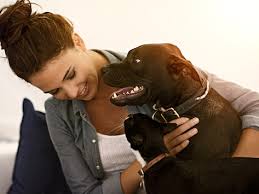Pets And Pet Parents
December 28, 2020

As I write, my dog and cat sit curled up next to me—warm and comforting —as they have been through this pandemic. So many posts on social media echo my sentiment. Pet parent have written about their animals being a lifeline, about how they survived isolation because their pets fulfilled needs for talking, touch and companionship. This offers perspective on the human- animal bond in the context of covid-19 induced isolation.
There’s considerable research, as well as the commonly-held opinion, that having pets can result in potential physical and mental health benefits, and can improve the well-being of their humans. Pets can be a source of social and emotional support, love, stability, and routine. It’s possibly one of the reasons that worldwide trends of the search term “adopt a dog” were significantly higher as compared to previous years. In India too, we have seen a growth in both dog and cat ownership—be it buying or adoption —with people not facing the usual barriers of pet parenting such as time spent out of the home.
So, are pet parents faring better with the disruption of daily life patterns and routines? With drastic financial pressures, social and emotional loneliness, the loss of control, will pet parents emerge with greater resilience because of the role pets play in their lives? First, it’s important to point out that living with pets and having strong bonds with them can also lead to emotional distress and psychological vulnerability. For most pre-existing cat or dog owners here in India, other than the common stressors of covid-19, many were struggling with procuring pet food, accessing veterinary care, and being unable to walk their dogs in public. Groups of pet parents banded together to discuss strategies for pet care if they fell ill, or were taken in for institutional quarantine, and many families suffered the compounded distress of being covid-19 positive and being unable to care for their pets. There’s also the long term worry in the mind of many—what will happen to my pet when I resume going out and inhabiting a post-covid world?
These concerns must be seen in light of the fact that distress and mental health concerns of pet parents negatively affect the well-being of their companion animals. Multiple studies in the West have found that pets have experienced stress-related behavioral changes during covid-19. Some of the common behavioral issues seen during this time have been excessive barking or mewing, fear of sounds, destructiveness, need for attention, generally being easily excitable or easily frustrated or nervous.
While some of these behaviours are connected to the pet parent’s mental health, they’re also a consequence of changing human patterns that affect the animals daily routines, confinement to home, additional time and space shared with other humans in the home, combined with decreased interactions with external persons, animals and environments. While the above may imply that pet cats have it easier than dogs as cats tend to live only indoors—this is not true as most cats have had to deal with increased human contact, touch and attention—which they cannot escape from or limit especially as their human are leaning on their pets increasingly for support.
The more the human relies on the pet to cope, the more the bond between them may intensify, but also may put strain on the animal. The increased reliance will also worsen the cycle of distress for both the pet and parent as people start to go out more as vaccines become available, or more spaces accommodate distancing. Both the pet parent and pet will see a change in their routines and each could potentially develop separation anxiety.
Such stressors are already visible for the young puppies or kittens who became part of homes during the pandemic. These young animals and their families may be the most susceptible to such vulnerabilities as the animals spent their formative months in lockdown and isolation. Such pets have spent much time confined in homes with a small group of humans, being lavished with attention and barely seeing strangers, hearing traffic or being around other animals. Now as we venture out knowing more about how covid-19 is transmitting, young dogs are becoming overwhelmed by the world, causing bad leash walking, inability to adapt to going to the outside the home, nervousness, fear and aggression. Cats may hide, be fearful or have problems using their litter box as we have family or visitors over. The animals distress and inability to accompany or be alongside the human in such ‘normal’ situations, increases the humans frustration and stress levels. In the long term, an intense, imbalanced bond can increase stress and anxiety on a daily basis for both human and pet as well as fatigue and strain from trying to change a pets behaviours. Some humans may also face pressure from partner, family and neighbours regarding a pet’s problematic behaviour or may have to live with tensions within the family over the pet. That being said, don’t hit the panic button if you’re a new pet parent, or if your trusted companion of many years is showing signs of stress. Remember that you cannot lean on only one person, or only your pet. You need multiple coping strategies to deal with the pandemic and its long term effects. Look at what your cat’s or dog’s behaviour is telling you about their emotional needs. Even as the world opens up and we reset boundaries of spatiality, time and resilience, remember that this too will require mental and emotional labour from you and your pet.













